2025/26 Lecture Programme
Please note that due to a major refurbishment of the Elim Church, our meetings from October 2025 until at least March 2026 will take place at The Pavilion in Ashbourne Park, 7 Cokayne Avenue, Ashbourne, DE6 1EJ.
The meetings start at 1.00 pm and the speaker will begin at 1.30 pm. The meetings will end at 3.00 pm.
Entry is free to members and £5.00 for non-members payable at the door. Refreshments are also available. Free parking is also available on site or along Cokayne Avenue.
2025
Friday 26 September.
The Historic Village of Mapleton with Rachel Hodgkinson
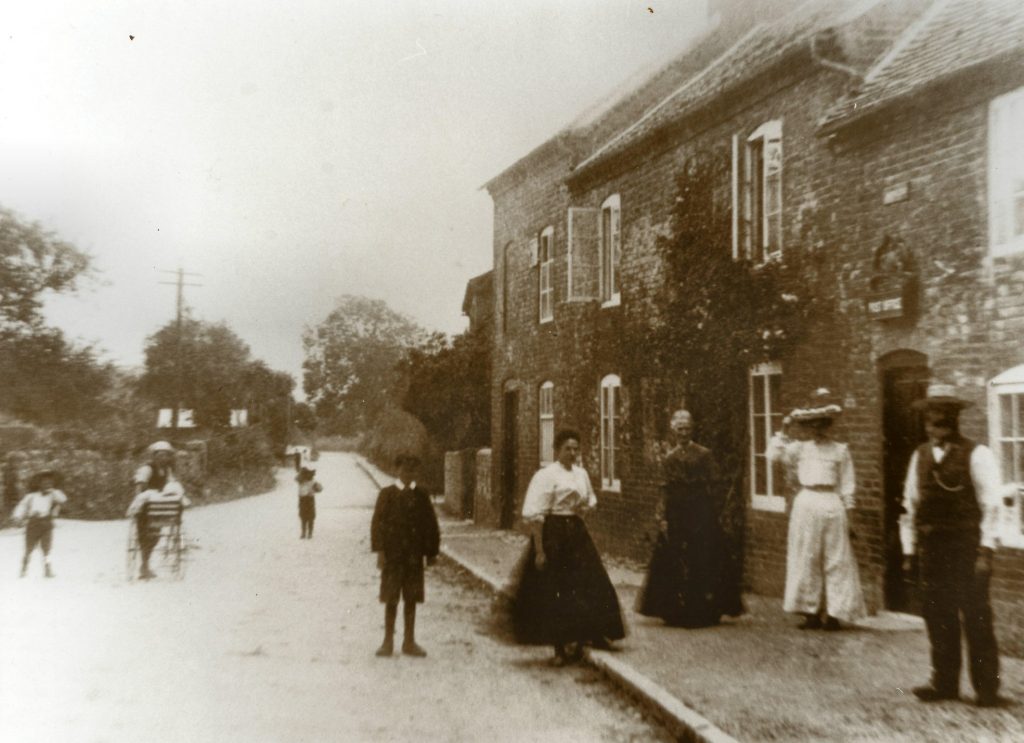
The first meeting of the new programme will be a walk around the historic village of Mapleton which will be guided by local resident and member of the Society, Rachel Hodgkinson.
Now a sleepy village, Mapleton was once a busy place with so many trades one hardly needed to travel to the nearby town of Ashbourne. Surrounded by a landscape with many stories of its own to tell, over the centuries it has been home to lords, paupers and everyone in between.
Our walk will be a gentle one that will last about an hour and end with refreshments at the village Pavilion where there will be some history displays. There will be a stop part way through for a quick sit down if anyone needs it. Mostly on level ground there will be a couple of fields we venture into but no difficult inclines.
Supportive footwear suitable for walking is advised.
Meet at 2 pm for a 2.15 pm start at Mapleton Pavilion car park. This is on the left-hand side after the first 6 houses in the village approaching from Ashbourne and is signposted.
Places are limited to 20 attendees, which will be allocated on a first come, first served basis. Please request a place by emailing ashbourneheritagesociety@gmail.com. If interest exceeds 20, or you are unable to make this date but would like to do the tour, it may be possible to arrange an additional visit
Rachel Hodgkinson
Rachel has been researching family and social history for ten years now and besides her personal research she has done work for both individuals and community events. Through her interest in textiles, she has developed a variety of fibre art skills. Recently she has been combining these with her interest in all things heritage, producing pieces that interpret her research in a tactile, visual display.
Update on the Historic Village of Mapleton
Around 20 members of the Society enjoyed an interesting and informative walk around Mapleton on Friday. We visited seven different sites around the village, including the unusual St Mary’s Church, see pic below, where at each site Rachel gave an explanation of the history of the site and some insights into the families involved. The walk finished with tea and biscuits in the new Pavilion on the playing fields where there were further displays and photographs. many thanks to Rachel for a thoroughly enjoyable afternoon.
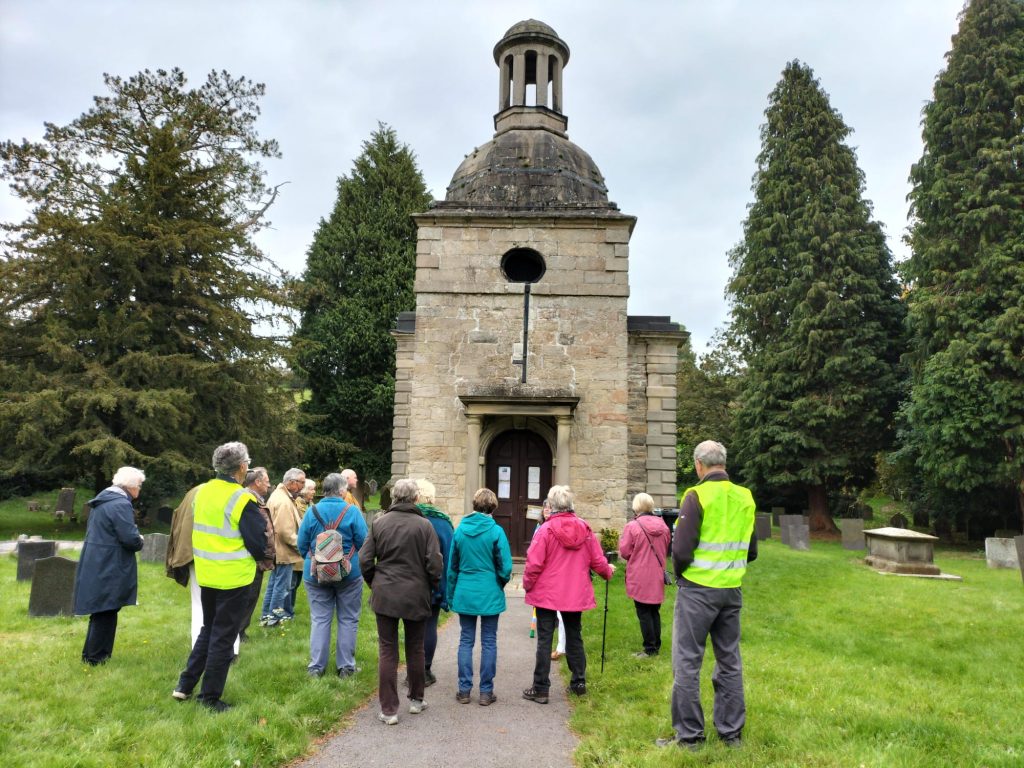
Friday 24 October.
Victorian and Edwardian Tourist Souvenirs, and Ashbourne by John Titterton MA FSA FHS
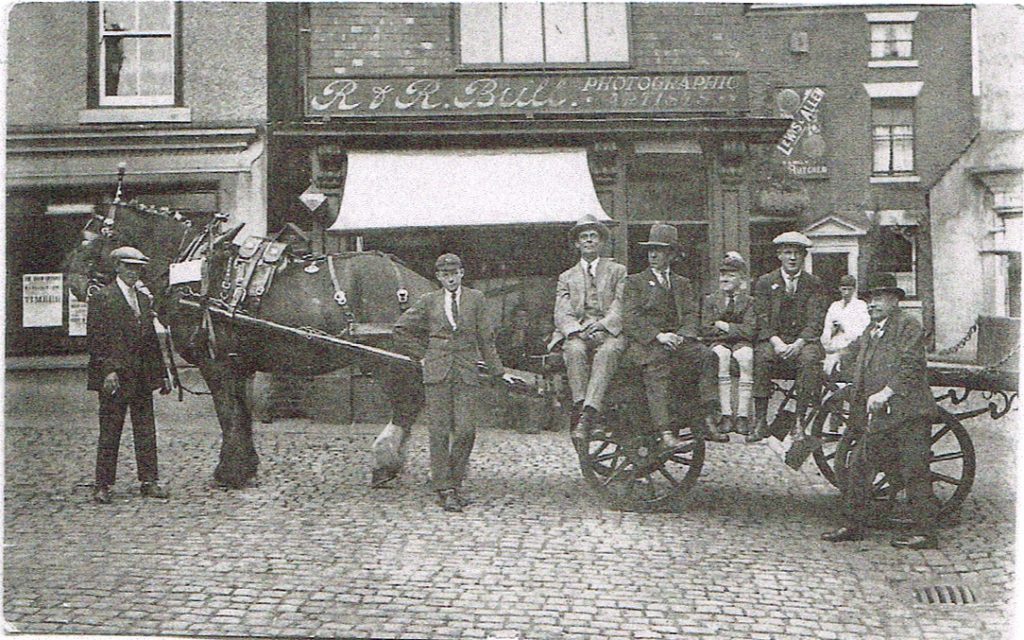
The arrival of the railway in Ashbourne in 1853 was a significant event which changed many aspects of the town. It provided opportunities for local traders to buy goods from remote manufacturers and sell them in the town. Ashbourne residents could now buy items produced in far away places such as Norwich and Dorset.
As well as goods, the train also brought people, i.e tourists. They created their own demand for goods. The two most obvious ones were souvenirs, either for their own keepsakes of for gifts to give to relatives and friends. At the end of Queen Victoria’s reign post cards were introduced and started a practice which is still going today.
This talk will look at the rise of the souvenir industry, the Ashbourne businesses that sold them and at the items and post cards one could buy in Ashbourne. Integral to this is the history of the rise of Goss China.
John Titterton
John was born and brought up near Stafford and went to University in London. By profession he was an Electrical Engineer responsible for keeping the lights on in central Southern England. After living for a number of years at Reading and briefly at Portsmouth he now lives in Ashbourne, a place where his grandfather was born and grew up. His hobbies include Family History, Local History and Heraldry.
John has researched many aspects of the history and heritage of the town and spoken about it to local societies and organisations. He managed the Ashbourne Heritage Centre in Church St in its early years (It started in 2010) and produced many of the display boards there. He was one of the lead organisers of the Ashbourne Treasures exhibition in 2017. He currently arranges the speakers’ programme for the society.
Update on the Victorian and Edwardian Tourist Souvenirs
About 30 members and visitors met at the new venue to hear John Titterton’s talk about how the arrival of the train brought more visitors and tourists to Ashbourne and about some of the traders who began trading in Ashbourne and from where they obtained their supplies. John also brought along a number of items of “Goss” china, which were among some of the most popular souvenirs bought in Ashbourne.
The venue seemed to be popular with members, and further comments have been received after the meeting, all of which were complimentary.
Friday 28 November.
In Search of England’s Oldest Pubs by Dr James Wright
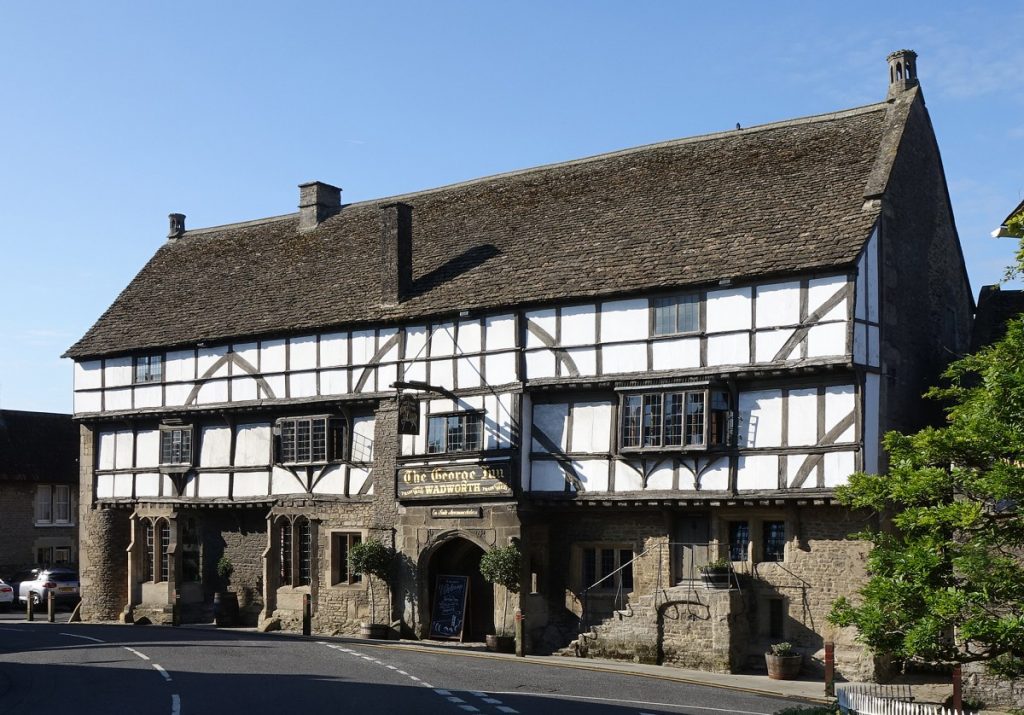
Numerous claims are made to be Britain’s oldest pub from all corners of the isles. Pubs have been the beating heart of communities for centuries and there are firm regional rivalries when it comes to competing for the very oldest boozer. Is it ever possible to come close to identifying which establishment has been serving up the beers for the longest?
Using a combination of archaeological and documentary evidence, this talk will delve deeply into the historical development of British pubs through the mediaeval period. Can we begin to define the physical characteristics and date of pubs from their architecture? The claims of well-known buildings will be put to the test and those of more obscure pubs brought to the fore. Just where is Britain’s oldest pub?
Dr James Wright
The speaker, James Wright (Triskele Heritage), is an award winning buildings archaeologist. He has two decades professional experience of ferreting around in people’s cellars, hunting through their attics and digging up their gardens. He hopes to find meaningful truths about how ordinary and extraordinary folk lived their lives in the mediaeval period. He is the author of the popular Mediaeval Mythbusting Blog and his book Historic Building Mythbusting was published via The History Press on 6 June 2024.
Update on “In Search of England’s Oldest Pubs”
Another well attended meeting at our new venue, for the time being anyway, to hear James talk entertainingly to us about the myths around the claims to be England’s oldest pub. We learnt that there are numerous claims to this prestigious title. But there can only be one. But which one? James debunked many of these claims based on his research of archaeological evidence, historical records and dendrochronology. Nottingham has three pubs claiming to be England’s oldest. Are these claims correct? Well, our members and guests now know!
Friday 19 December.
Christmas Event
The last meeting of the year will be a social meeting with a seasonal heritage themed quiz and a festive buffet. Attendees are welcome to bring contributions to the buffet. There is also a bar where hot drinks and other alcoholic and non-alcoholic drinks are available.
Attendees are also welcome to bring along a heritage related object for discussion and possible identification.
Our Christmas meeting was very well attended, with a well supplied “fuddle”, an interesting quiz with a mixture of heritage and seasonal questions and a mystery object brought along by Mick Gadsby, which turned out to be a type of tinder box.
2026
Friday 23 January.
Napoleonic French Prisoners of War in Derbyshire by Dr Mark Barnard
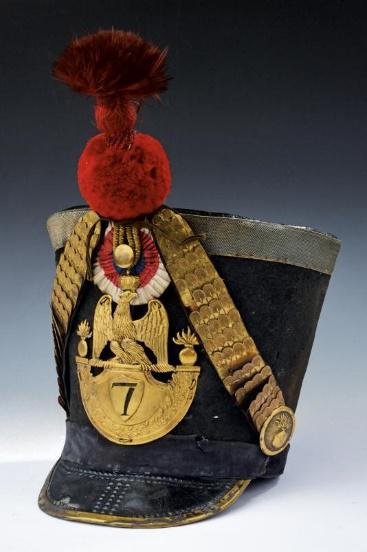
As many of us are aware, there is a long history of strained relations between Britain and France. Personified by the TV Series Sharpe that usually portrays the French during the Napoleonic Wars as ‘irretrievably odious’, conflicting national interests since at least Joan of Arc usually kept the two nations divided.
During the Napoleonic Wars, over 100,000 French prisoners or ‘the others’ were held in Britain at various times – some for many years. But did their reception reflect the damning depictions conveyed in such productions as Sharpe? How, for instance, were French POWs received in Ashbourne, Leek and Cambridgeshire? Did any escape? Were any romances struck up? Had opinions of the French changed by the end of the Napoleonic Wars?
Join Dr. Barnard to hear the story of the world’s first purpose-built inland POW camp & how ‘the others’ were received in Derbyshire and beyond.
Dr. Mark Barnard
For ten years, Mark has delivered history courses & talks for an adult educational organisation but since January, he presents courses for The Mechanics Institute in Nottingham as part of their ‘leisure learning’ remit. These have included such themes as the Normans, France, the American War of Independence and Germany. His last talk was about the impact of Zeppelins on England and his next talk is on how the French Revolution was saved at Valmy in September 1792.
His current interests are his family history, learning French, Italian and decent documentaries. But today, Mark will be telling us about the world’s first purpose-built inland POW camp & how the Napoleonic French prisoners were received in Derbyshire and beyond.
Update on Napoleonic Prisoners of War in Derbyshire
We heard from Mark about the the first Prisoner of War camp built in Peterborough and the prisoners of war in Ashbourne; the arrangements for housing the officers and the “other ranks”; the exchange of prisoners with the French; how there were many more French than British prisoners requiring the creation of a special prison for them; the work undertaken by the pows and the sale of their handiworks; and fees they charged for giving French and dancing lessons. The raffle raised £29.00.
Friday 27 February.
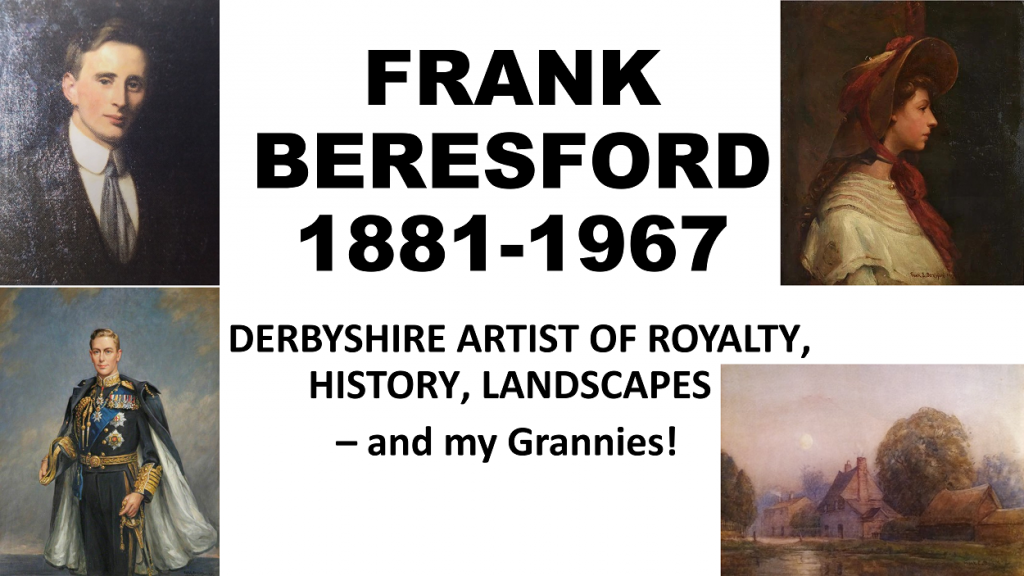
Robert will present chronologically Frank’s long artistic career with examples of his over 3000 paintings. He looks at some of the characters he portrayed, his period as a war artist and his many journeys into foreign lands.
Robert Reid
Robert was a boarder at QEGS, and for over four decades a Town and Country Planner within Derbyshire. Part of his formative years were spent in Nova Scotia where he developed a love of nature and the great outdoors. Robert’s passion for our visible heritage has resulted in over 50 articles published in the Duffield Scene. He has presented a pictorial biography of his Canadian paternal heritage, including his father’s wartime career in the Merchant Navy.
Friday 27 March.
Mary Queen of Scots and Staffordshire
A talk by Trevor Fisher.
Friday 24 April.
William Collins, Sir Gilbert Scott’s Builder
A talk by John Titterton
Friday 22 May.
Landscapes Unlocked: Stories from the Peak District’s Image Archive
A talk by Anna Badcock, the Peak District National Park’s Cultural Heritage Manager.
Friday 26 June.
Annual General Meeting
You can also visit us at:
Facebook: https://www.facebook.com/ashbourneheritagesociety
Twitter/X: @ashheritagesoc